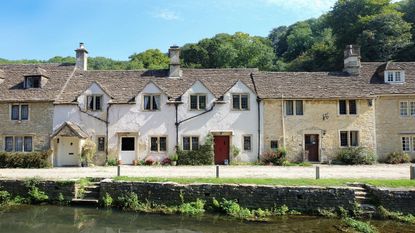Halifax: first annual drop in house prices since 2012
Higher mortgage costs and inflation worries hitting confidence among house buyers, leading to house price falls.


The annual rate of house price growth turned negative in May, the first time this has happened since 2012, the latest house price index from Halifax has revealed.
In the 12 months to May, typical house prices declined by 1%, down from the 0.1% annual rate of growth recorded in the year to April. As a result the average property is now worth £286,532.
For May itself, house prices remained largely static, dropping by just £130 from the average value of £286,662 recorded in April.
Subscribe to MoneyWeek
Subscribe to MoneyWeek today and get your first six magazine issues absolutely FREE

Sign up to Money Morning
Don't miss the latest investment and personal finances news, market analysis, plus money-saving tips with our free twice-daily newsletter
Don't miss the latest investment and personal finances news, market analysis, plus money-saving tips with our free twice-daily newsletter
Kim Kinnaird, director of Halifax Mortgages, said that the annual rate of decline was down to the comparison with “strong house prices this time last year”, when the market continued to be buoyant heading into the summer months.
She continued: “Property prices have now fallen by about £3,000 over the last 12 months and are down around £7,500 from the peak in August. But prices are still £5,000 up since the end of last year, and £25,000 above the level of two years ago.”
There is no shortage of house price indices in the UK, and between them they have told a varied tale into how the housing market is currently performing.
Why have house prices fallen?
A big factor in the drop in the average value of homes over the last year has been the mortgage market.
We have seen mortgage rates become far more expensive, and that is impacting the ability of potential buyers to borrow, particularly when their finances are already under additional pressure due to the persistently high rate of inflation.
Kinnaird noted that financial markets are now expecting the Bank of England’s base rate to increase above 5% for the first time since 2008, as the Bank of England attempts to bring down inflation, and those forecasts have led to interest rates on fixed rate mortgages being increased once again.
She added: “This will inevitably impact confidence in the housing market as both buyers and sellers adjust their expectations, and latest industry figures for both mortgage approvals and completed transactions show demand is cooling.”
Where are house prices falling the most?
Southern England has seen the most pronounced drops in house prices over the last year.
In the South East prices are down by 1.6%, to an average of £385,943, for example, while the South West has seen prices drop by 1.4% to a typical £301,079.
Greater London has also seen larger than average falls, with prices down by 1.2%
Halifax found that every region of the UK had seen annual house price growth in May weaken when compared with April, except in Wales where growth was unchanged at 1.1%.
The region that has performed the best over the last year has been the West Midlands, where prices are up by 2.7% to an average of £251,137. It is followed by Yorkshire & Humberside, where prices have increased by 2.3% to an average of £205,035.
What types of houses are seeing house prices fall?
Existing houses have dropped starkly in value, with an annual rate of decline of 1.9% according to Halifax. By contrast, new build properties grew in value by 2.8%, though it’s notable that this is nonetheless the weakest rate seen for nearly three years.
Detached houses were the only property type to see annual growth, with values up by 0.4%. Flats saw the sharpest falls at 1.9%, followed by terraced (-1%) and semi-detached houses (-0.5%).
John Fitzsimons has been writing about finance since 2007, and is a former editor of Mortgage Solutions and loveMONEY. Since going freelance in 2016 he has written for publications including The Sunday Times, The Mirror, The Sun, The Daily Mail and Forbes, and is committed to helping readers make more informed decisions about their money.
-
-
 Investment trust discounts hit 2008 levels. Here’s how to profit
Investment trust discounts hit 2008 levels. Here’s how to profitInvestment trust discounts have risen to levels not seen since 2008, here are three trusts looking to buy to profit.
By Rupert Hargreaves Published
-
 A luxury stock to buy at a high street price
A luxury stock to buy at a high street priceInvestors wrongly consider Watches of Switzerland a high-street outlet.
By Dr Matthew Partridge Published
-
 Investing in wine: how Cru Wine is reaching new audiences
Investing in wine: how Cru Wine is reaching new audiencesTips Gregory Swartberg, founder of fine wine specialist Cru Wine, talks to Chris Carter about how to start a wine collection
By Chris Carter Published
-
 Small companies with big potential
Small companies with big potentialMichael Taylor of Shifting Shares reviews his 2023 picks and highlights more promising minnows.
By Michael Taylor Published
-
 The MoneyWeek portfolio of investment trusts – July 2023 update
The MoneyWeek portfolio of investment trusts – July 2023 updateTips A decade ago we set up the MoneyWeek portfolio of investment trusts. They remain a compelling long-term bet says Rupert Hargreaves
By Rupert Hargreaves Published
-
 Women lead the way with ethical investments
Women lead the way with ethical investmentsDemand for more ethical investments has soared – and women are more likely to opt for them. Annabelle Williams, personal finance specialist at Nutmeg, takes a look at why.
By Annabelle Williams Published
-
 BoE: Mortgage payments to rise by £220 a month for households
BoE: Mortgage payments to rise by £220 a month for householdsMillions of households can expect a mortgage spike of around £200 a month - and some may even reach a extra £1,000 a month, the Bank of England warns
By Marc Shoffman Published
-
 What happened to Thames Water?
What happened to Thames Water?Thames Water, the UK’s biggest water company could go under due to mismanagement and debt. We look into how the company got itself into this position, and what investors should expect.
By Simon Wilson Last updated
-
 Where to invest in the metals that will engineer the energy transition
Where to invest in the metals that will engineer the energy transitionA professional investor tells us where he’d put his money. This week: John Ciampaglia, manager of the Sprott Energy Transition Materials UCITS ETF.
By Nicole García Mérida Published
-
 How investors can profit from high food prices
How investors can profit from high food pricesThe latest furore over grocery prices will die down, says David Stevenson. But the long-term outlook for soft commodities remains bullish. These are the stocks investors can buy to profit from high food prices.
By David J Stevenson Published









